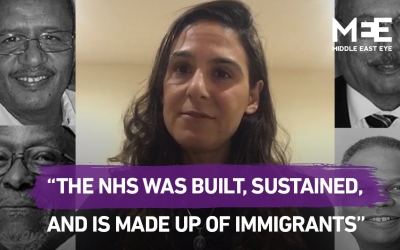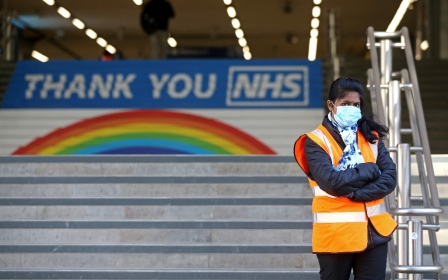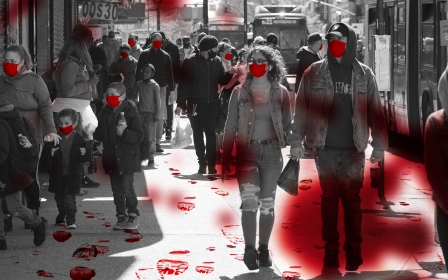Coronavirus: UK health body accused of downplaying role of racism in report on BAME deaths
A UK government health body is being accused of censoring key submissions from organisations that focused on the role of racism and how it may have contributed to the disproportionate number of coronavirus-related deaths among Black, Asian, and minority ethnic (BAME) people in Britain.
The submissions were part of a review published by Public Health England (PHE) on Tuesday, which aimed to investigate the disproportionate number of Covid-19 deaths within the BAME community in England.
New MEE newsletter: Jerusalem Dispatch
Sign up to get the latest insights and analysis on Israel-Palestine, alongside Turkey Unpacked and other MEE newsletters
The PHE report concluded that people of Bangladeshi ethnicity had approximately twice the risk of dying from the disease than white Britons.
Those of Chinese, Indian, Pakistani or other Asian ethnicities, as well as those of Caribbean or other Black ethnicities, had a 10 to 50 percent higher risk of death than those in the white British group, PHE said.
The UK government denied on Tuesday allegations that PHE had published its review earlier than anticipated, after reports claimed it was delayed because of global anger over the police killing of a Black man, George Floyd, in the United States on 25 May.
An earlier draft of the PHE review obtained by the Health Services Journal (HSJ), however, showed that a section that had included responses from over 1,000 organisations was completely removed from the final version.
Many of the submissions, according to the HSJ, said discrimination and poorer living conditions were part of the reasons behind the increased number of Covid-19 deaths in the BAME community.
The Muslim Council of Britain (MCB), along with other organisations, submitted evidence to the review and highlighted the role "structural discrimination and racism" played in the increased number of deaths across England.
Some of its key recommendations include exploring the impact of deprivation and the role of structural racism, discrimination, and Islamophobia within the NHS and its impact on the BAME community.
Harun Khan, secretary-general of the MCB, welcomed PHE's decision to establish a review into the disproportionate impact of Covid-19 on BAME individuals; but he criticised its failure to discuss how racism "contributed" to the spread of the pandemic in such communities.
"To choose to not discuss the overwhelming role structural racism and inequality has on mortality rates and to disregard the evidence compiled by community organisations, whilst simultaneously providing no recommendations or an action plan, despite this being the central purpose of the review, is entirely unacceptable," Khan said in a statement.
"It beggars belief that a review asking why BAME communities are more at risk fails to give even a single answer....[and is] concerning."
A spokesperson for Public Health England declined to comment on whether it had censored groups like the MCB from its review, telling Middle East Eye that it was engaging with the MCB and other organisations within the BAME community.
"The valuable insight [review head Professor Kevin Fenton] has gathered [from groups like MCB and others] will inform the work the Equalities Minister is now taking forward," the PHE spokesperson said.
Britain has the second-highest number of deaths in the world from the coronavirus, with 39,369 confirmed deaths due to the virus according to UK government figures.
Middle East Eye delivers independent and unrivalled coverage and analysis of the Middle East, North Africa and beyond. To learn more about republishing this content and the associated fees, please fill out this form. More about MEE can be found here.






